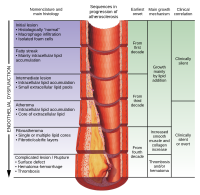
Photo from wikipedia
Systemic peroxidation status has been reported as a pathogenic factor for multiple sclerosis (MS). Systemically elevated oxidation levels are associated with serum lipid peroxidation and somatic telomere length (TL) shortening.… Click to show full abstract
Systemic peroxidation status has been reported as a pathogenic factor for multiple sclerosis (MS). Systemically elevated oxidation levels are associated with serum lipid peroxidation and somatic telomere length (TL) shortening. We investigated whether vitamin E (VE) administration suppresses peroxidation and improves clinical symptoms in 34 MS patients. We analyzed serum lipid peroxidation and degree of TL in circulating leukocytes of MS patients before and after VE treatment. The oxidation level was enhanced and TL was shortened in MS. The MS population treated with VE 400 mg/day for 3 months showed significantly reduced serum lipid oxidation level with maintenance of TL. These findings showed that systemic peroxidation is associated with the development of MS. Antioxidants such as vitamin E can be candidates for supplementary therapeutic agents for MS.
Journal Title: Canadian journal of physiology and pharmacology
Year Published: 2018
Link to full text (if available)
Share on Social Media: Sign Up to like & get
recommendations!